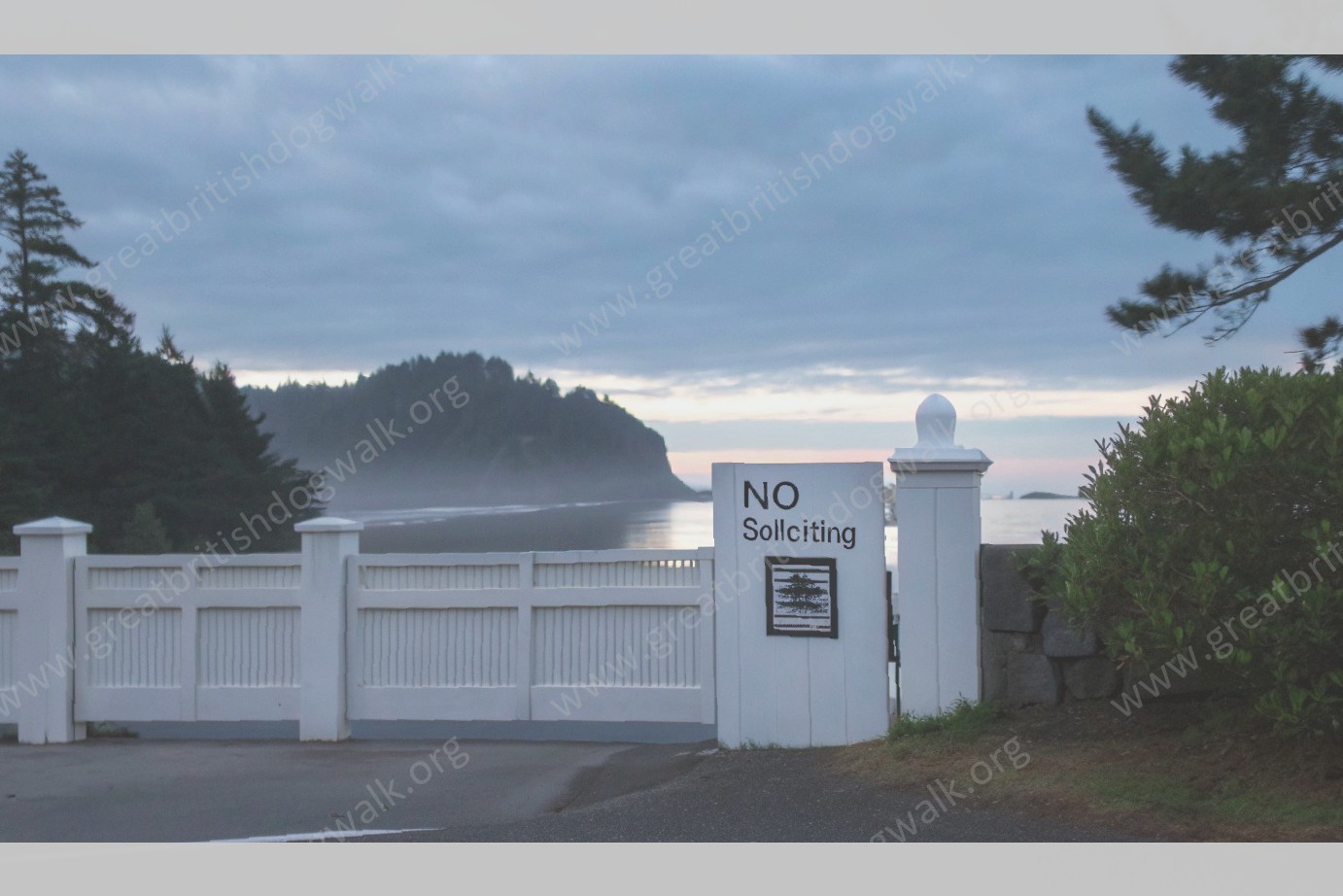What Are the No Soliciting Laws in Oregon?
Each state has its own laws and regulations regarding signs, including "no soliciting" signs. As a general rule, no soliciting ordinances are either content-based or content-neutral. Content-based ordinances regulate speech based on its communicative content or subject matter. So, for example, a content-based ordinance restricting solicitation on a homeowner’s property to only political speech would be considered content-based. Content-neutral ordinances, on the other hand, regulate speech with no regard as to the subject matter. They instead limit speech based on other factors, such as time, place , and manner.
One of the main purposes of no soliciting sign laws in Oregon is to protect property owners’ right to quiet enjoyment and free from unwanted visitors. In Oregon, there are three types of no soliciting sign laws: 1) state law that provides for criminal trespass in the second degree; 2) state law that prohibits criminal trespass pursuant to the definition of "premises;" and 3) county or municipal ordinances prohibiting criminal trespass on private property. The use of "no soliciting" signs thus has a basis in state law, and certainly in the context of a property subject to such an ordinance it is clear that the purpose is to keep unwanted solicitors off the property.

What Is Considered Soliciting in Oregon?
While we’ve covered what an Oregon No Soliciting sign means on the blog, we haven’t discussed the legal definition of soliciting and what it means. Under Oregon law, any recorded violation of 90.825 is a Class C civil infraction, which is basically a fine. If you think you’ve been solicited in violation of 90.825 you can sign up for an affidavit. The affidavit basically states the person who comes to your door is soliciting in a violation of 90.825 and it also gives the address where that violation occurs.
To be found in violation of 90.825 a person just has to be soliciting. In other words, a person can be found in violation of 90.825 if he/she is selling goods or items but this also includes canvassing. Canvassing is for political or religious material, even if nothing is being sold. That means if someone comes on to your property or private residential areas and is just talking about their candidate of choice, their religion, or a pet dog, they’re duly notifying or soliciting.
Being or acting as a solicitor is not expressly illegal in Oregon. The state has deemed that any solicitation in this fashion can be prohibited when it comes to soliciting to private homes or private property. This right is reserved under the constitutional law.
The definition of a solicitor is any individual who visits or attempts to visit a residence for the purpose of selling, soliciting, or otherwise engaging in an activity that results in the obtaining of paid business.
Proper Placement and Requirements of No Soliciting Signs
A property owner may place "no soliciting" and/or "no trespassing" signs at the entrance of their property. A governing body may, by ordinance, define the types of activities subject to the provisions of Chapter 165 of the Oregon Revised Statutes, which include prohibitions or regulation of activity on private property in unincorporated areas. Such signs have the same force and effect as any lawful ordinance adopted by the governing body of a city or county and any violation is a Class A violation.
The governing body may designate a private property to which signs apply. The designation of a property is effective for the period specified in the ordinance or until such time as the designation is repealed. Notice under this section may not be required upon initial designation of the property. In any case the designation must be reviewed by the governing body in the calendar year in which the third anniversary of the date of the initial designation falls.
The issue regarding "no soliciting signs" whether a sign can merely be placed and the sign will be enforceable. The Oregon Court of Appeals dealt with this issue in White v. Pyle in 1986. The Court held that unless it is "clearly apparent that the legislature intended a mandatory method of giving notice or a discretionary method of giving notice" the discretionary methods of giving notice apply. Although the property owner argued that an "abutting owner must give actual notice to the solicitors by a letter, and if by letter, he or she necessarily has to employ a lawyer to prepare the letter" which is consistent with Oregon’s Rule of Notice, the Oregon Court of Appeal held that because the statute does not specify if notice must be in writing, the sign or tacit consent of owners directly abutting the property was sufficient to give notice to the individuals who solicited the plaintiff’s business.
In another case Lindgren v. Huber in 1994, the Oregon Court of Appeals held that an oral communication given by an owner of the property to another party that he or she verbalizes to individuals conducting survey opinions on a property is proper notice for purposes of ORS 165.572.
Legal Implications of No Soliciting Signs in Oregon
Individuals or businesses that willfully ignore no soliciting signs may face civil liability under Oregon law. Statutory provisions apply to all persons, corporations and organizations that conduct sales directly from their vehicles to householders in the state. Private property owners who fail to post signs denying permission to enter may seek injunctive relief against intruders who commit a trespass. The Oregon statutes prohibit any person from engaging in a solicitation if an identifiable resident at the dwelling makes a request to depart. Any unsolicited request for money without a commercial purpose is considered a solicitation; however , sales presentations related to specific products and services are not a solicitation unless money changes hands. Nonprofit organizations have no immunity from these provisions. Criminal penalties apply to repeat offenders that have been convicted of a violation stemming from three previous offenses. Solicitations targeting businesses and commercial establishments are covered by legal limitations. Persons who are soliciting the business should be asked to depart immediately. If they disregard the request, the business can seek an injunction against these individuals to enter a court order that prohibits their entrance. Repeated violations of such an order can lead to contempt of court charges against the solicitors. In 1987, the Oregon legislature took action to protect property owners from unwanted solicitations by providing an injunction remedy for trespassers who disregard no trespassing signs. Under ORS 105.550, a property owner may file a civil action to enjoin the conduct of any person who enters the property with no implied or expressed permission.
Enforcement of No Soliciting Signs and How to Report Them
In Oregon, enforcing no soliciting sign laws typically falls under the jurisdiction of local municipalities. Municipal ordinances dictate the scope of regulation, whether enforcement will be civil or criminal, and whether there are defined penalties. Generally speaking, residents in most areas of Oregon can enforce by simply asking infringers to leave, and refusing to listen to any excuses. If an individual does not adhere to a no soliciting sign after a verbal request to leave, a resident may contact local law enforcement to remove the violator. Whether they do so often and to what extent they enforce the ordinances depends upon the jurisdiction. For example, Portland residents often resort to placing a call to local law enforcement, while Portland’s police typically refer them to local code enforcement officers, and the latter typically respond only if the violation constitutes an actual trespass rather than an attempted trespass. In addition to contacting law enforcement, residents can file for a restraining order limiting the tresspassing individual or company from coming onto their property for a specified period of time.
Property owners are allowed to use reasonable force to remove someone from their property in Oregon provided that the person possesses "no more than a de minimis (minimal) degree of force or injury." The exact scope of reasonable force permitted varies from jurisdiction to jurisdiction. However, inviting people onto property for purposes other than business transactions (for example, door-to-door sales) may invite liability for injuries people suffer as a result of the invitation (i.e. dog bite).
Best Practices for No Soliciting Signs
When considering whether to post no soliciting signage on their property, property owners should consider a number of practical aspects:
- When designing no soliciting signage, consider the optimal locations for maximum visibility in both daylight and nighttime conditions.
- In addition to the obvious front entrance of the property or building, consider whether additional locations will adequately capture attention of potential solicitors, e.g., the sidewalk, walkway, gate, buttons for entry phone systems, etc.
- In addition to good visibility in the daytime, consider reflective material for no soliciting signage to ensure they are visible at night as well. Reflective signs can be more impactful to an approaching solicitor in the evening .
- Consider the legal implications of no soliciting signs before using them on your property. Keep in mind that, if no soliciting signs are used hastily, too many or too few may later hinder law enforcement officers in enforcing no soliciting regulations.
- If exact wording is not important, consider making use of symbols, which may be more succinct and specific to the issue at hand.
- Before posting no soliciting signs, check with local authorities to be sure there are not existing sign regulations that may limit the size, quantity, placement, manner or locations of no soliciting signage.
- Consider the potential impact to security if no soliciting signage is used; maintaining "no trespassing" signage may be important to maintain security.


